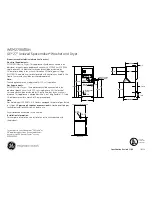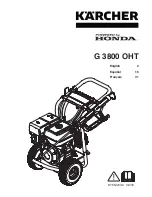
Page 14 — English
OPERATION
USING PUMP PROTECTOR
See Figure 17.
Regular use of a commercially available pump protector
prolongs the life of the pressure washer by removing hard
water mineral deposits, lubricating pump seals and pistons,
and preventing freeze damage. Pump protector should be
added to the unit after every use and before storage. Pump
protector can be purchased at the retailer where you pur-
chased your pressure washer, or by calling customer service.
The instructions that follow are typical for adding pump pro-
tector but you should always verify the specific instructions
provided by the manufacturer of the pump protector used.
Turn off the pressure washer motor and shut off the water
supply.
Pull trigger to release water pressure.
Disconnect garden hose and high pressure hose.
Unscrew threaded top from pump protector bottle and
remove paper seal from bottle. Reinstall top on bottle
and tighten securely.
NOTE:
The rubber seal should remain inside the threaded
top. If it comes out, be sure to replace before reinstalling
the top.
Remove bottle cap and attach threaded end of bottle
securely to pressure washer pump water intake.
Squeeze bottle to inject contents into pump.
Pump is protected when the protector fluid exits the
pump outlet.
POWER CORD STORAGE
See Figure 18.
When it is not in use, the power cord may be wrapped around
the two brackets on the back of the unit.
To secure the power cord in place, flip the bracket to the
up position.
MOVING THE PRESSURE WASHER
See Figure 19.
NOTE:
Never lift or carry this product using the handle and
never place the unit in any position other than upright on
its wheels.
Turn the pressure washer off.
Tilt the machine toward you slightly until it balances on
the wheels then roll the machine to the desired position.
Do not tilt forward or sideways when moving.
DO NOT attempt to move the unit by pulling on any of
the hoses.
















































